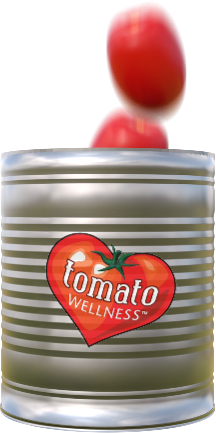
by Tomato Wellness | Sep 15, 2021 | News
It is no secret that a diet high in saturated fats can lead to high cholesterol levels, hyperlipidemia, and even heart disease. But is drinking tomato juice worth a try for your health? Read on to learn about the effects of tomato juice on hyperlipidemia.
Cardiovascular disease is one of the most prevalent diseases that affects Americans each year. One of the driving factors for this is a diet high in saturated fats and highly processed carbohydrates, which is why eating a diet rich in phytonutrients can help fight against disease.
One of the richest sources of phytonutrients are canned tomato products. Due to the heating that is done during processing, lycopene is much more bioavailable [1]. While some vegetables lose nutrients during processing, tomatoes become more nutrient rich.
With so many nutritional benefits and cancer-fighting properties, researchers are continually finding ways that canned tomatoes can fight heart disease. One recent study tested the effects of tomato juice on high levels of fats in the blood (hyperlipidemia) with hamsters. The study was conducted in this manner because hamsters process cholesterol and respond to a high fat diet in a similar way to humans [1]. With this study, these small rodents were fed a diet high in cholesterol to induce hyperlipidemia. After eating the high cholesterol diet, the hamsters had significantly high levels of total cholesterol, triacylglycerol, high-density lipoprotein cholesterol, low-density lipoprotein cholesterol, and LDL/HDL ratio [1]. They were then fed tomato juice to examine if this had a reversed effect. After six weeks of consuming tomato juice, the hamsters had lowered levels of serum cholesterol and they excreted more fat in their feces. These results show that tomato juice supplementation may be a possible option for lowering blood lipid levels and reduce the effects of high blood lipids in humans [1].
If you are not a fan of drinking plain tomato juice, go ahead and get creative in the kitchen! You can blend it into your daily smoothie, add it to gazpacho, or throw it into a pot of meatballs that are simmering in sauce.
References:
- Lee, L.-C., Wei, L., Huang, W.-C., Hsu, Y.-J., Chen, Y.-M., & Huang, C.-C. (2015). Hypolipidemic effect of tomato juice in hamsters in high cholesterol diet-induced hyperlipidemia.Nutrients,7(12), 10525–10537. https://doi.org/10.3390/nu7125552

by Tomato Wellness | Aug 19, 2021 | News
Canned tomatoes and other tomato products are a sustainable option. However, new research shows that waste from producing tomato products can be repurposed using new green technology. Keep reading to learn more!
Here at Tomato Wellness, we are all about tomatoes, and for good reason! They are tasty, easy to incorporate in recipes, and have tons of health benefits. In addition to this, canned tomatoes are great for the environment, which means they are a sustainable option. When purchased canned, they can last longer on your shelf and will not go to waste! What makes canned tomatoes such a great addition to your diet is the lycopene content found within them. Lycopene is an extremely important antioxidant and can protect against disease such as cancer and heart disease.
Each year, the tomato processing industry creates between 600 thousand to 2 million tons of pomace [1]. Pomace is the pulpy residue that is left over after processing the tomatoes. Usually, this pomace is discarded, leaving an enormous amount of food waste behind. It has been concluded that tomato pomace can be used to extract lycopene. This greatly reduces waste, as pomace that would have been discarded is repurposed. In addition to this, researchers are trying out a new method of extracting lycopene that can be much more eco-friendly. Previously, the most common method of extracting lycopene was using hexane, an organic solvent that is a pollutant [1]. In search of a greener method, researchers have begun to use deep eutectic solvents (DES) [1]. These solvents are sustainable, affordable, and easy to produce. The results from the first attempt with this method show that the results were comparable with the hexane method of extraction and show much promise for a more sustainable future!
While canned tomato products were already a sustainable option to begin with, coming up with an additional use for one of their byproducts with green technology is simply groundbreaking! So, the next time you choose a tomato product at the grocery store, remember that you’re doing good for the health of both your body and our planet.
1.Silva, Y. P., Ferreira, T. A., Jiao, G., & Brooks, M. S. (2019). Sustainable approach for lycopene extraction from tomato processing by-product using hydrophobic eutectic solvents. Journal of Food Science and Technology, 56(3), 1649–1654. https://doi.org/10.1007/s13197-019-03618-8

by Tomato Wellness | Aug 10, 2021 | News
With all the oxidative stressors present in the environment, it can be easy to worry about our health. Did you know that tomatoes contain properties which protect us against DNA damage and aging? Read more to find out how!
Your body is constantly exposed to oxidative stress. Anything from smoking, drinking alcohol, excessively exercising, or spending time in the sun can produce reactive oxygen species (ROS) which lead to oxidative stress in our bodies [1]. Throughout a normal day, your body can be exposed to many oxidative stressors, which can cause damage to your DNA and speed up the aging process. Things as common as spending time in UV rays or exercising excessively can harm your body on a cellular level. However, there is no need to panic, as eating a healthy diet can protect against the damage caused by these stressors. Foods such as fruits and vegetables contain compounds called antioxidants that can repair the damage caused by oxidative stressors. One of the foods that is the best at doing this job are tomatoes!
So, how can tomatoes protect us against DNA damage and aging? In this study, 10 healthy people drank tomato juice every day for 3 weeks in order to test its effects on reducing oxidative stress. The study found that regular consumption of tomato juice lowered the levels of two markers of oxidative stress in the body [1]. The reason for this is because of the lycopene and beta-carotene in the tomato juice.
The results of this study look promising, but does this mean that you must drink tomato juice every day in order to protect yourself? The good news is that you can take advantage of the health benefits of tomatoes no matter what form they are in! So, enjoy your daily serving of tomatoes in the form of juice, sauce, salsa, or whatever your heart desires to protect against DNA damage and aging!
1.Nakamura, A., Itaki, C., Saito, A., Yonezawa, T., Aizawa, K., Hirai, A., Suganuma, H., Miura, T., Mariya, Y., & Haghdoost, S. (2017). Possible benefits of tomato juice consumption: A pilot study on irradiated human lymphocytes from healthy donors. Nutrition Journal, 16(1). https://doi.org/10.1186/s12937-017-0248-3

by Tomato Wellness | Jul 13, 2021 | News
What is one of the many powers that tomatoes have on human health? They help to reduce the risk of certain types of cancer! Learn more about the antioxidant properties of lycopene and canned tomatoes when it comes to cancer prevention.
It’s important to make sure that we are fueling our bodies with the proper nutrients to live a healthy lifestyle. This includes eating well-balanced meals that contain foods such as fruits, vegetables, whole grains, and lean protein. One source of food that is guaranteed to boost nutrient intake is tomatoes and tomato-based products. Tomatoes contain lycopene—a carotenoid that gives tomatoes their vibrant red color and has various health benefits–which plays an integral role in the improvement of heart health, protection from the sun, and reduction in certain types of cancer.
The incorporation of lycopene-rich foods, especially tomato-based products, have been shown to boost overall health. One specific research study gathered 19 healthy human subjects to identify the impacts that the consumption of tomato-based products—tomato juice, spaghetti sauce, and tomato oleoresin—had on each individuals’ body when the certain tomato-based products were consumed for a period of one week. The results of the study showed that since these products contain dietary lycopene, which is found in tomato products, they may act as antioxidants. In addition to the antioxidant properties found in tomatoes, lycopene is readily absorbed from tomato products. When food is readily absorbed by your body, it aids in gut health and digestion. Therefore, the correlation between lycopene, antioxidant powers, and tomatoes is strong, and researchers suggest that tomatoes can play a crucial role in the prevention of cancer.
As previously mentioned, tomato juice, spaghetti sauce, and other sources of tomato products can improve health and reduce risk of diseases. This goes to show that eating healthy can be made simple. For example, if someone told you to eat pasta with tomato-based spaghetti sauce to boost your nutrient intake, you would easily agree because it’s THAT easy! The best part about tomatoes is that they are extremely versatile and can be paired with both sweet and savory ingredients to whip up a flavorful, nutrition meal. So let’s get cookin’ with canned tomatoes!
Check out some delicious recipes featuring canned tomatoes:
Pan Seared Pork Chops with Bourbon Peach Compote
Easy Chicken Curry
Pizza Stuffed Chicken
The BEST BLT Dip

by Tomato Wellness | Jul 2, 2021 | News
What’s one specific vegetable that is associated with high content of essential nutrients as well as antioxidant-rich phytochemicals? If you guessed tomatoes, then you are absolutely right! Learn more about the positive health effects of tomato products.
Tomatoes and tomato-based products contain a wide range of critical nutrients that keep your body functioning properly. These include (but are not limited to) vitamins, minerals, proteins, carotenoids, monounsaturated fatty acids, and phytosterols. The daily consumption of these nutrients are required in order to maintain a healthy lifestyle. Whether it’s in the form of ketchup, sauce, or paste, the antioxidant powers found in canned tomatoes can truly have a beneficial long-term effect on your health.
A recent research study provided evidence-based research that suggests the carotenoid found in tomato-based food products contains lycopene, which helps to prevent cardiovascular diseases, cancer, cognitive function, and osteoporosis. The positive correlation between the consumption of tomatoes and enhancement of the body’s antioxidants helps to reduce oxidative stress, which protects against DNA, cell, and protein damage. The consumption of tomatoes contains bioactive compounds that may also play a role in the prevention of constipation, reduction of blood pressure and blood cholesterol levels, improvement of digestion and body fluid balance, stimulation of blood pressure, and more. Boosting human health is our number one goal, and what better way to do so than by eating plant foods that we genuinely enjoy!
The benefits of canned tomatoes are an incentive to go out and purchase canned tomato products to get cooking in your kitchen. There are a wide range of recipes that you can whip up for you and your family to enjoy, such as pizza, pasta, tacos, and lasagna. These are easy, affordable recipes that will save you time and money while boosting your nutrient intake. If you’re new to cooking with tomatoes, check out some tomato-packed recipes found on the Tomato Wellness website for inspiration!
For other tomato news, check out:
Top 11 Reasons to Go Red with Tomato Products
Can Tomatoes Help Your Kid Eat More Veggies?
What is Lycopene?
Health Connection Between Tomatoes and Lycopene

by Tomato Wellness | Apr 26, 2021 | News
Do you prefer fresh, cooked, or canned tomatoes? While both are nutritious, cooked and canned tomatoes may actually contribute more to long-term health benefits in comparison to fresh tomatoes! Read on to learn more about the benefits of canned tomato products and how YOU can easily incorporate them into your daily recipes.
Thanks to busy schedules that leave little time for cooking nutritious meals at home, how are we expected to get all our nutrients in every single meal? This is a concern for many, so you are not alone. One easy, affordable way to secretly pack in those nutrients is by purchasing canned products, specifically canned tomatoes. These products range from tomato paste, diced tomatoes, salsa, and tomato sauce. They are easy to find at your local grocery store and contain incredible ingredients that will enable you to lessen your worries about obtaining proper nutrient intake.
In general, all tomato products help to improve the health of the general population, but an increasing amount of research studies have shown that there is more lycopene availability found in heated, cooked, or canned tomatoes when compared to fresh tomatoes—making them more effective in the long run. According to the American Institute for Cancer Research, cooked tomatoes play more of an effective role in reducing the risk of prostate cancer. Unfortunate as it is, prostate cancer is one of the top 2 most common cancers in the world and has resulted in numerous deaths. However, recent science-based evidence has shown that the increase in lycopene, an antioxidant found in tomatoes, can help to reduce the risk of prostate cancer. The research study focused on the comparison between men who failed to consume any tomato products throughout the week with men who consumed canned and cooked tomatoes about five to six times a week. The results showed that those who consumed tomato products were able to reduce their risk of prostate cancer by 28%, which goes to show just how powerful food can play a role in our overall health.
Although the impacts of cooked and canned tomato products may outweigh the benefits of fresh tomatoes, it’s still useful to incorporate tomatoes into your weekly recipes so that you can achieve optimal health and reduce your risk of preventable cancers. Whether it’s pasta, pizza, or a taco dish, tomato products are super easy to use and will save you time and money while boosting your nutrient intake. So, what are you planning to whip up in the kitchen for your family this week? Let us know in the comments below!




Recent Comments